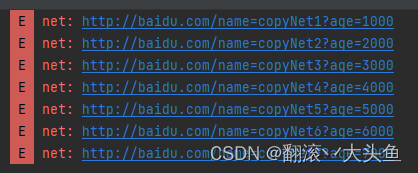本片文章将用反射和注解仿照retrofit只需要传入一个带有给定注解的接口,通过调用接口就能直接将传入的数据和注解进行结合,生成对应参数
1,自定义注解
对字段的修饰
@Retention(RetentionPolicy.RUNTIME)
@Target(ElementType.PARAMETER)
public @interface AnnotationField {String value();
}仿照GET方法注解
@Retention(RetentionPolicy.RUNTIME)
@Target(ElementType.METHOD)
public @interface AnnotationGet {String value();
}通过动态代理实现注解和数据拼装
public class RetrofitCopy {public <T> T create(final Class<T> service) {return (T) Proxy.newProxyInstance(service.getClassLoader(),new Class[]{service},new AssemblyParametersInvocationHandler());}private class AssemblyParametersInvocationHandler implements InvocationHandler {@Overridepublic Object invoke(Object proxy, Method method, Object[] args) throws Throwable {StringBuilder builder = new StringBuilder();for (Annotation annotation : method.getAnnotations()) {if (annotation instanceof AnnotationGet) {AnnotationGet get = (AnnotationGet) annotation;builder.append(get.value());}}Parameter[] parameters = method.getParameters();for (int i = 0; i < parameters.length; i++) {Parameter parameter = parameters[i];for (Annotation annotation : parameter.getAnnotations()) {builder.append(getParementerAnnotationValue(annotation));builder.append("=");}builder.append(args[i]);if (i < parameters.length - 1) {builder.append("?");}}Log.e("RetrofitCopy", "net: " + builder.toString());return null;}}private String getParementerAnnotationValue(Annotation annotation) {String data = "";if (annotation instanceof AnnotationField) {AnnotationField field = (AnnotationField) annotation;return field.value();}return data;}}创建接口api
public interface Api {@AnnotationGet("http://baidu.com/")void getData(@AnnotationField("name")String name,@AnnotationField("age") int age);
}
执行调用代码
val api = RetrofitCopy().create(Api::class.java);api.getData("copyNet1", 1000);api.getData("copyNet2", 2000);api.getData("copyNet3", 3000);api.getData("copyNet4", 4000);api.getData("copyNet5", 5000);api.getData("copyNet6", 6000);api.getData("copyNet7", 7000);打印数据如下

这个就是retrofit封装参数的原理,是不是和retrofit一样,只需要接口,然后接口调用方法就可以了


:Cache分配策略Cache更新策略Cache逐出策略)
)







)







